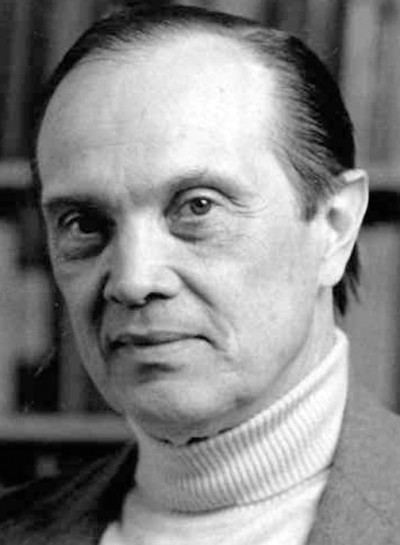George A. Miller (George A. Miller)

Miller was born on February 3, 1920, in Charleston, West Virginia, the son of an executive at a steel company, George E. Miller, and Florence (Armitage) Miller. Soon after, his parents divorced. He grew up with only his mother during the Great Depression, attended public school, and graduated from Charleston High School in 1937. He relocated with his mother and stepfather to Washington D.C., and was at George Washington University for a year. His family practiced Christian Science, which required turning to prayer, rather than medical science, for healing. After his stepfather was transferred to Birmingham, Alabama, Miller transferred to the University of Alabama.
He received his bachelor’s degree in history and speech in 1940, and a master’s in speech in 1941 from the University of Alabama. He had taken courses in phonetics, voice science, and speech pathology . Membership in the Drama club fostered his interest in courses in the Speech Department. He was also influenced by Professor Donald Ramsdell, who introduced him both to psychology, and, indirectly through a seminar, to his future wife Katherine James. They married on November 29, 1939. Katherine died in January, 1996. He married Margaret Ferguson Skutch Page in 2008.
Miller taught the course “Introduction to Psychology” at Alabama for two years. He enrolled in the Ph.D. program in psychology at Harvard University in 1943, after coming to the university in 1942. He received his doctorate in 1946 from Harvard’s Psycho-Acoustic Laboratory, under the supervision of Stanley Smith Stevens, researching military voice communications for the Army Signal Corps during World War II. His doctorate thesis, “The Optimal Design of Jamming Signals,” was classified top secret by the US Army. He was on the faculty at Harvard, MIT and Rockefeller University before settling at Princeton in 1979.
In his later years, Miller enjoyed playing golf. He died in 2012 at his home in Plainsboro, New Jersey of complications of pneumonia and dementia. At the time of his death, he was survived by his wife Margaret; the children from his first marriage: son Donnally James and daughter Nancy Saunders; two stepsons, David Skutch and Christopher Skutch; and three grandchildren: Gavin Murray-Miller, Morgan Murray-Miller and Nathaniel James Miller.
After receiving his doctorate, Miller stayed as a research fellow at Harvard, to continue his research on speech and hearing. He was appointed assistant professor of psychology in 1948. The course he developed on language and communication would eventually lead to his first major book, Language and communication (1951). He took a sabbatical in 1950, and spent a year as a visiting fellow at the Institute for Advanced Study, Princeton, to pursue his interest in mathematics. Miller befriended J. Robert Oppenheimer, with whom he played squash. In 1951, Miller joined MIT as an associate professor of psychology. He led the psychology group at MIT Lincoln Lab. He worked on voice communication and human engineering, whereupon he identified the minimal voice features of speech required for it to be intelligible. Based on this work, in 1955, he was invited to a talk at the Eastern Psychological Association. That presentation, “The magical number seven, plus or minus two”, was later published as a paper which went on to be a legendary one in cognitive psychology.
Miller moved back to Harvard as a tenured associate professor in 1955 and became a full professor in 1958, expanding his research into how language affects human cognition. At the university he met a young Noam Chomsky, another of the founders of cognitive science. They spent a summer together at Stanford training the faculty, and their two families shared a house. In 1958–59, Miller took leave to join the Center for Advanced Study in the Behavioral Sciences at Palo Alto, California, (now at Stanford University). There he collaborated with Eugene Galanter and Karl Pribram on the book Plans and the Structure of Behavior. In 1960, along with Jerome S. Bruner, he co-founded the Center for Cognitive Sciences at Harvard. The cognitive term was a break from the then-dominant school of behaviorism, which insisted cognition was not fit for scientific study. The center attracted such notable visitors as Jean Piaget, Alexander Luria and Chomsky. Miller then became the chair of the psychology department. Miller was instrumental at the time for recruiting Timothy Leary to teach at Harvard. Miller knew Leary from the University of Alabama, where Miller was teaching psychology and Leary graduated with an undergraduate degree from the department.
In 1967, Miller taught at Rockefeller University for a year, as a visiting professor, researching how lexical memory was stored, but declined a position as professor in experimental psychology. A new president’s selection at Rockefeller made him leave. In 1979, he moved to Princeton as the James S. McDonnell Distinguished University Professor of Psychology. In 1986, he helped in founding the Cognitive Science Laboratory at Princeton. Eventually he became a professor emeritus and senior research psychologist at Princeton. He also directed the McDonnell-Pew Program in Cognitive Science.
Miller had honorary doctorates from the University of Sussex (1984), Columbia University (1980), Yale University (1979), Catholic University of Louvain (1978), Carnegie Mellon University (in humane letters, 2003), and an honorary DSC from Williams College (2000). He was elected to the American Academy of Arts and Sciences in 1957, the National Academy of Sciences in 1962, the presidency of the Eastern Psychological Association in 1962, the presidency of the American Psychological Association in 1969, and to the Royal Netherlands Academy of Arts and Sciences in 1985. Miller was the keynote speaker at the first convention of the Association for Psychological Science in 1989. He was a Fulbright research fellow at Oxford University in 1964–65, and in 1991, received the National Medal of Science.
Born
- February, 03, 1920
- USA
- Charleston, West Virginia
Died
- July, 22, 2012
- USA
- Plainsboro, New Jersey

